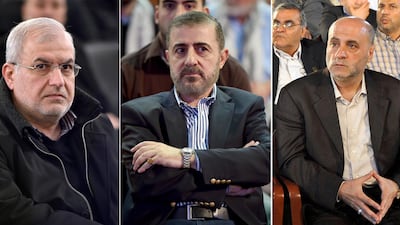The US warned against drawing a “false distinction” between Hezbollah’s terror and political activities on Tuesday as it imposed sanctions on two leading Lebanese parliamentarians and a high-ranking security official.
They were placed on a sanctions blacklist by the US Treasury for terror-related activity in the first time the US has moved against members of the Lebanese Parliament.
MPs Amin Sherri and Muhammad Raad, and security official Wafiq Safa, were sanctioned for "acting for or on behalf" of the group that remains a key regional proxy of Iran and fought in Syria for President Bashar Al Assad.
“Hezbollah uses its operatives in Lebanon’s Parliament to manipulate institutions in support of the terrorist group’s financial and security interests, and to bolster Iran’s malign activities,” said Sigal Mandelker, Treasury’s undersecretary for terrorism and financial intelligence.
“Hezbollah threatens the economic stability and security of Lebanon and the wider region, all at a cost to the Lebanese people.
"The United States will continue to support efforts of the Lebanese government to protect its institutions from exploitation by Iran and its terrorist proxies, and to secure a more peaceful and prosperous future for Lebanon.”
Echoing language from the US Secretary of State Mike Pompeo, a senior US official said the “gloves are well and truly off” as Washington sought to stop Iran and Hezbollah from using Lebanon as a “forward operating missile base” in the region.
“Hezbollah uses its place in Parliament and in the Lebanese government as a cover to insulate itself from pressure from the Lebanese state,” a senior official said.
The US decision "is a humiliation for the Lebanese people", Hezbollah MP Ali Fayyad told Lebanon's MTV news channel.
Mr Fayyad called on parliament and the government to issue a formal condemnation.
Lebanese Finance Minister Ali Hasan Khalil meanwhile tweeted that the US sanctions "concern all of the Lebanese even if they are directed at Hezbollah" and are "unjustified".
After the US Treasury's announcement, Hezbollah television Al-Manar said the group's leader, Hassan Nasrallah, was due to appear Friday on TV.
Mr Nasrallah is due to address a series of Lebanese and regional issues and is expected to also discuss the latest sanctions.
The move to put sanctions on Mr Raad strikes at the leadership of the Hezbollah faction in the Lebanese Parliament, which won 13 seats at the last election.
When Cabinet was formed in late January after nearly nine months of wrangling, Hezbollah gained a third ministry for the first time since it joined the government in 2005. The vote was widely interpreted as a strong gain for the party.
The UN has called for “the disarmament of all armed groups in Lebanon so that there will be no weapons or authority” there outside of the state. But Hezbollah continues to spurn the demand.
Praising the UK’s decision to proscribe all elements of Hezbollah, the US officials called on foreign governments to drop the false distinction between its political and armed interests.
“They are not really members of Parliament. They are really thug enforcers,” an official said. “There is no distinction that can be made between Hezbollah’s military and political wing.
“To any member of Hezbollah considering running for office, know that you will not be able to hide beneath the cover of political office."
Officials said Mr Raad was deeply implicated in the militia as a member of its Shura council, its highest command authority, since 2009.
They said he was head of the Hezbollah bloc in Parliament and had overall administrative and decision-making powers.
Mr Raad, 64, also acted as an enforcer to ensure the parliamentary representatives carried out Hezbollah's agenda, the officials said. He has been in parliament since 1992.
Mr Sherri, 62, was first elected as a Lebanese MP in 2005 and the US has photographs of him with Qassem Suleimani, commander of the Iran’s Islamic Revolutionary Guards Corps.
The US Treasury gave specific instances of intimidation carried out in support of associates targeted in previous sanctions.
It said that Mr Sherri was acting at the direct behest of Hezbollah secretary general Hassan Nasrallah.
“Sherri’s behaviour threatening bank employees and their family members is unacceptable for a member of parliament whose office should advance the interests of the Lebanese people,” a US official said.
Meanwhile Wafiq Safa was described as a lynchpin for Hezbollah's use of Lebanese institutions to smuggle illegal weapons and drugs into Beirut.
“As the head of Hezbollah's security apparatus, Safa has exploited Lebanon's ports and border crossings to smuggle contraband and facilitate travel on behalf of Hezbollah," the Treasury said.
"For example, Hezbollah leveraged Safa to facilitate the passage of items, including illegal drugs and weapons, into the port of Beirut."
Mr Safa also maintains the group's ties to financiers, Treasury said.
There are now 50 Hezbollah members and entities blacklisted by the Treasury since 2017.
American citizens are barred from dealing with the three men and any assets they might hold in the US have been frozen.
The sanctions also limit their ability to access the American financial system.

